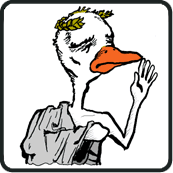3. MEET SOME HUMAN HEROES
Heroes can take different forms. Some are mixed breeds (one parent is human, the other is a god). Some are simply humans that have extraordinarily close interactions with the gods. Often the heroes are endowed with special powers. So we'll introduce you to four popular heroes: Heracles, Jason, Cassandra, and Tiresius.
- Heracles, who is also known as Hercules, was the ultimate Greek jock. He was born to the god Zeus and the human Alcmena. Hera, Zeus's wife, was jealous of Zeus having a child with another woman, so she sent snakes into Heracles' crib to kill him. Baby Heracles strangled both snakes, the first sign of his godly roots. As a teenager, Heracles slew the ferocious Lion of Cithaeron, saving the life of a king. Heracles also drove a chariot, was a major wrestler, and was a master at archery and fencing. To nurture his cultural side, he could also play the lyre.
- Jason is known as the "King of the Argonauts." (No, these guys didn't work for NASA, but they were explorers). The Argonauts' mission was to search for a special ram with gold fleece. Jason wanted to find the Golden Fleece because having it would save the land from famine and infertility. On his way to get the Golden Fleece, he ran into Medea, the daughter of a king, who fell in love with him. She promised to give him a special drug that would make him temporarily invincible if he would marry him. So, long story short: girl meets boy; girl anoints boy with drug; boy seizes golden fleece; girl gets boy. By the way, once the task was over, Jason left Medea, and she got so pissed off that she killed their children to punish him.
- Cassandra was the daughter of the King of Troy (as in Trojan War), and was endowed with the power of prophecy. The god Apollo was in love with her, and made her promise to return his advances. At first she consented, but then later changed her mind (tease). Apollo was so upset by her rejection that he stripped her of her powers of persuasiveness. As a result, one of her (accurate) prophecies that went unheeded led to the downfall of the Trojans in the Trojan War. Moral: Teach Apollo that no means no!
- Tiresius was the son of a human shepherd and the nymph, Chariclo. Tiresius was somewhat of a prophet, but was also blind. One story says that as a young boy, Tiresius watched the goddess Athena when she was naked and was blinded in retaliation. Despite his blindness, Zeus empowered him with the ability to see the future. Often in Greek dramas, the tragic hero will consult with Tiresius for advice. He acts as a symbol of irony - a blind man who can see the future. Pretty deep, huh?

 -->
-->